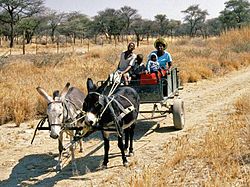- Damara people
-
This article is about the Damara people. For other uses, see Damara (disambiguation).
Damara 
Damara people in Damaraland, Namibia Total population 100,000[1] Regions with significant populations  Namibia
NamibiaLanguages Religion Both African Religion and Christianity
Related ethnic groups Nama, Kwisi, Kwadi, Cimba
The Damara (Khoekhoegowab: ǂNū-khoë, literally Black people, German: Berg Damara, referring to their extended stay in the hills of Khomas Highland, also called at various times the Daman or the Damaqua) are an ethnic group who make up 8.5% of Namibia's population. They speak the Khoekhoe language (like the Nama people) and the majority live in the northwestern regions of Namibia, however they are also found widely across the rest of the country. They have no known cultural relationship with any of the other tribes anywhere else in Africa,[2] and very little is known of their origin. It has been proposed that the Damara are a remnant population of southwestern Africa hunter-gatherers, otherwise only represented by the Cimba, Kwisi, and Kwadi, who adopted the Khoekhoe language of the immigrant Nama people.[3]
Their name in their own language is the "Daman" (where the "-n" is just the Khoekhoe plural ending). The name "Damaqua" stems from the addition of the Khoekhoe suffix "-qua/khwa" meaning "people" (found in the names of other Southern African peoples like the Namaqua and the Griqua).
Prior to 1870 the Damara occupied most of central Namibia, but large numbers were displaced when the Nama and Herero began to occupy this area in search of better grazing. Thereafter dominated by and working for the Nama and the Herero.[4]
In 1960, the South African government forced the Damara into the bantustan of Damaraland, an area of poor soil and irregular rainfall. About two quarter of their numbers still occupy Damaraland.[citation needed]
Clans
The Damara consist of 11 clans:[5]
- The ǂAo-daman used to live in the settlements of Outjo, Kamanjab, and Khorixas.[5]
- The Ao-guwun, their home settlement is Sesfontein.[5]
- Dâure Daman (English: Brandberg Damara after Dâures, the Khoekhoe name for the Brandberg Mountain)[5]
- The ǀGaio-daman (English: Paresis Damara) lived in the Paresis Mountains between Outjo and Otjiwarongo[5]
- The ǀGobanin (English: dune people after ǀgobas, dune) used to live in the area between Rehoboth, Seeis, and Hoachanas.[5]
- The ǁHuruben lived nomadic in the Namib Desert between Uniab River and Huab River.[5]
- The ǀKhomanin (named after the Khomas Highland)[5] in 1854 were more than 40,000 in number.[citation needed] Their tribal area today[update] is part of the City of Windhoek, rendering the clan essentially landless. Their Chief is Josephat Gawaǃnab.[6]
- ǃKhuise-daman (named after the Kuiseb River)[5]
- ǃOe-ǂAn (English: Erongo Damara after ǃOe-gas, the Khoekhoe name for the Erongo Mountains)[5] Their home settlement is Okombahe, their current leadership is disputed.[7]
- Hago-Daman (named after the Hakos Mountains)[5]
- Tsoaxudaman (English: Swakop Damara after Tsoaxaub, the Khoekhoe name for the Swakop River)[5]
Culture
The Damara are divided into tribes each governed by a chief but the tribe has only one King, King Justus Garoeb that rules over them. The names of the richest/most powerful chiefs were Prince ǀHai-hab, Chief Xamseb, ǁGuruseb just to name some. They practiced circumcision until to date. Their traditional colours are green, white and blue. The green and blue identifies the different sub groups, some women may wear white and blue some white and green, the white representing the peace and unity among all Damara-speaking people.
Some Damara women share a similar style of traditional dress to the OvaHerero, with the long, flowing dresses that look almost Victorian in style. However, the traditional hats that the Herero wear have longer 'horns' to resemble cattle.
The women do household chores like cooking, cleaning and gardening. Their Primary objective is milking the cows in the morning and nurturing the young. Men traditionally hunt and herd the cattle, leaving the village as early as the sunrise, patrolling their area to protect their cattle and grazing ground as tradition dictates. Men can be very aggressive towards intruders if not notified of any other male presence in his grazing area.
Though many Damara people own and live on rural farms, the majority live in the small towns scattered across the Erongo region or in Namibia's capital city of Windhoek. Those that still live on farms tend to stay with extended family so that as many as one hundred stay together, creating a small village of family members.
The Darama are very rich in cattle and sheep. Some chiefs possessing up to 8000 head of horned cattle.
References
- ^ James Stuart Olson, « Damara » in The Peoples of Africa: An Ethnohistorical Dictionary, Greenwood Publishing Group, 1996, p. 137
- ^ http://www.namibiatourism.com.na/people_damara.php
- ^ Blench, Roger. 1999. "Are the African Pygmies an Ethnographic Fiction?". Pp 41–60 in Biesbrouck, Elders, & Rossel (eds.) Challenging Elusiveness: Central African Hunter-Gatherers in a Multidisciplinary Perspective. Leiden.[1]
- ^ http://www.namibiatourism.com.na/people_damara.php
- ^ a b c d e f g h i j k l Malan, Johan S (1998) (in German). Die Völker Namibias [The Tribes of Namibia]. Windhoek, Göttingen: Klaus Hess. pp. 134–135.
- ^ Smit, Nico (7 October 2011). "Evicted ǀKhomanin vow to fight for ancestral land". The Namibian. http://www.namibian.com.na/news/full-story/archive/2011/september/article/evicted-khomanin-vow-to-fight-for-ancestral-land/.
- ^ Menges, Werner (7 October 2011). "Interdict issued to stop Okombahe ceremony". The Namibian. http://www.namibian.com.na/news-articles/national/full-story/archive/2011/october/article/interdict-issued-to-stop-okombahe-ceremony/.
Categories:- Ethnic groups in Namibia
- Damara people
Wikimedia Foundation. 2010.
